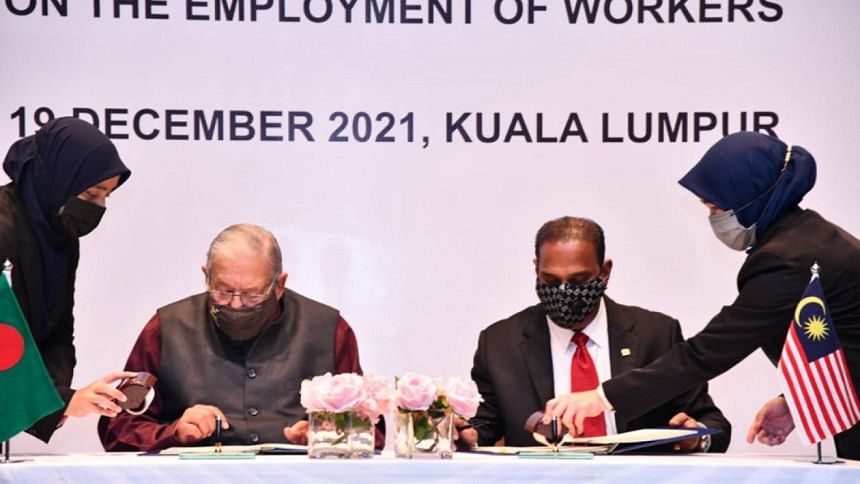Why so much secrecy over Malayisa-Bangladesh MoU to recruit workers?

Malaysia's agreement with Bangladesh on labour intake is shrouded in so much secrecy that even employers and agents do not have any access to details, reports a Free Malaysia Today opinion piece penned by K Parkaran.
The memorandum of understanding between Malaysia and Bangladesh was signed on December 19. Human Resources Minister M Saravanan later issued a statement merely saying it had been signed and the governments will be working towards a smooth intake of workers.
The only clause he mentioned is that workers are to be provided housing that meets government standards under the law to address the element of forced labour.
Hardly reassuring as the recruitment was suspended in September 2018 by the Pakatan Harapan government following complaints of abuse, corruption and forced labour.
Other than this, nothing has been officially made public.
Surely it would make sense for at least the major points agreed upon to be made known to all stakeholders, so that the foreign workers are protected.
Parkaran, a researcher and journalist, wrote that the whole world knows Malaysia is paying dearly for the way employers and authorities have treated migrant workers. The number of manufacturers whose products have been barred by countries like the United States, Canada and the United Kingdom is testimony to our misdeeds.
Malaysia seems to be guarding the MoU like gold dust while Bangladesh has made details of the document public. Its expatriates' welfare and foreign employment minister Imran Ahmad posted a statement on the ministry's Facebook listing details of what the intended workers can expect.
When FMT spoke to the SME Association of Malaysia recently on the recruitment expected to start soon, it was not told of any details of the MoU. Its spokesman said they have only been told that they have to pay for the documentation cost of the workers upon their arrival.
When pointed out that the MoU does mention that employers are required to foot the airfare to and from Malaysia in addition to the cost of documentation involved as announced by the Bangladesh minister, he said they are not aware of it.
He contended that the document was not a binding agreement and that the employers could negotiate with the recruitment agencies on this matter, depending on the urgency of the need for foreign workers in their companies.
Rightfully, workers' rights NGO Tenaganita has pointed out that it is vital for the workers coming here to know of their specific rights. Any misconduct by employers or the authorities will only lead to complaints of forced labour, a matter that the International Labour Organization (ILO) has been emphasising of late.
The government and the employers also have to worry about Andrew Hall, an activist for global migrant workers and labour rights. He has been at the forefront of labour abuse exposures in Malaysia, which led to actions against a number of manufacturers.
Privately, a few employers say they are more worried about Hall than about the Malaysian government or the labour department enforcement officers. Well, Malaysia does not have to fear him if the government acts against errant employers without fear or favour.
It is pertinent to bear in mind that Malaysia was downgraded to Tier 3 in the US State Department's annual human trafficking report last year, with the reason being it does not fully meet the minimum standards for the elimination of human trafficking and is not making significant efforts to do so. This mainly involved the recruitment of migrant workers.
So it was shocking that Saravanan defended the ministry's action of keeping details of the MoU a secret when transparency is needed to protect the rights of the workers.
The reason he offered appears to be a little shallow.
"In this country, when have MoUs ever been made public? Some people are taking a special interest (in the MoU). I don't know why. Is there something more to this?" he said.
"I've been in the government for almost 15 years as a deputy minister and a minister (and) we have never disclosed the details of MoUs."
That was his argument, disconcerting at a time when Malaysia is close to being a global pariah for the way we treat the poor migrant workers who help to keep the economy moving, while earning relatively low wages compared to locals.
We all know of the extensive corruption that was involved in the past in labour recruitment, with some politicians involved directly. This resulted from the lack of transparency with certain favoured agencies having complete control of labour intake. Some of these cases are still ongoing in court and have not been resolved.
So for the sake of transparency and to avoid Malaysia going back to the mess it went through prior to 2018, the government must be transparent.
There have been cases of large numbers of helpless foreign workers being promised high salaries and allowances only to realise on arrival that they had been cheated.
There must be transparency and openness when it comes to bringing in foreign workers.
An MoU between Malaysia and Indonesia on domestic maids is also on the cards.
The Malaysian government must be transparent and open if it hopes to be upgraded to Tier 2 in the next US annual human trafficking report.

 For all latest news, follow The Daily Star's Google News channel.
For all latest news, follow The Daily Star's Google News channel. 



Comments